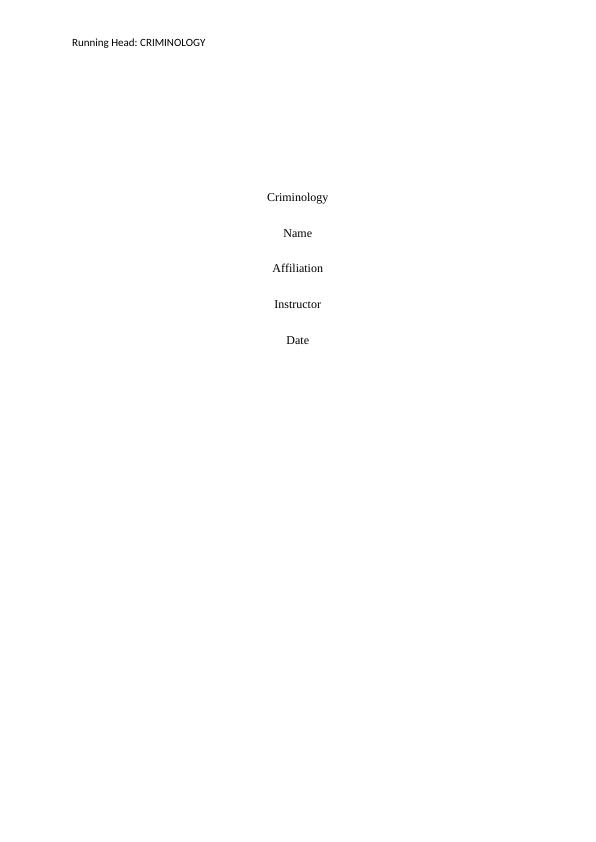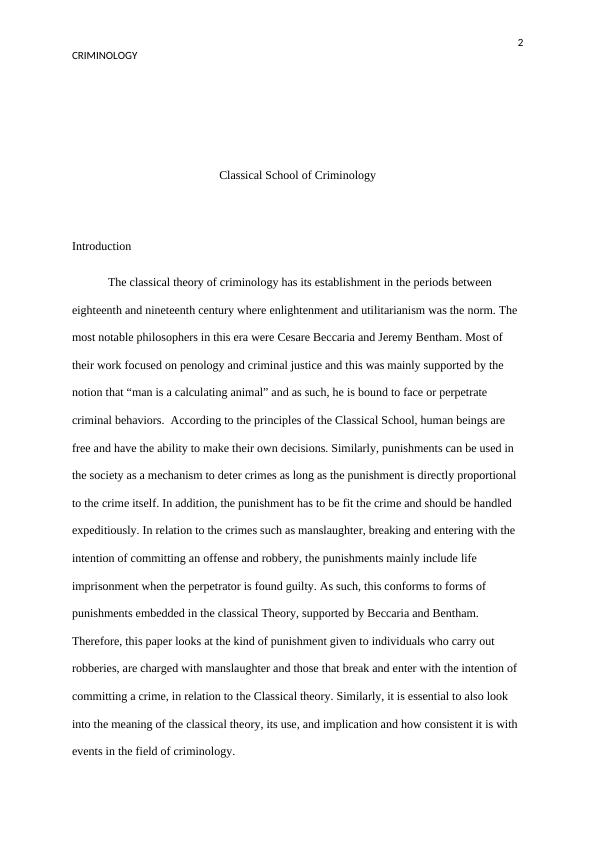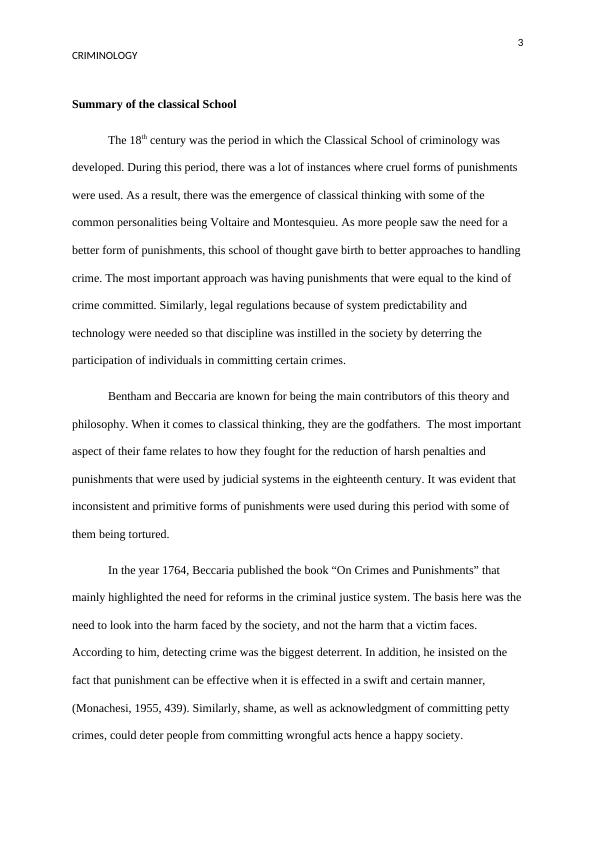Classical School of Criminology: Punishments for Robbery, Manslaughter and Breaking and Entering
Added on 2023-06-10
6 Pages1324 Words481 Views
Running Head: CRIMINOLOGY
Criminology
Name
Affiliation
Instructor
Date
Criminology
Name
Affiliation
Instructor
Date

2
CRIMINOLOGY
Classical School of Criminology
Introduction
The classical theory of criminology has its establishment in the periods between
eighteenth and nineteenth century where enlightenment and utilitarianism was the norm. The
most notable philosophers in this era were Cesare Beccaria and Jeremy Bentham. Most of
their work focused on penology and criminal justice and this was mainly supported by the
notion that “man is a calculating animal” and as such, he is bound to face or perpetrate
criminal behaviors. According to the principles of the Classical School, human beings are
free and have the ability to make their own decisions. Similarly, punishments can be used in
the society as a mechanism to deter crimes as long as the punishment is directly proportional
to the crime itself. In addition, the punishment has to be fit the crime and should be handled
expeditiously. In relation to the crimes such as manslaughter, breaking and entering with the
intention of committing an offense and robbery, the punishments mainly include life
imprisonment when the perpetrator is found guilty. As such, this conforms to forms of
punishments embedded in the classical Theory, supported by Beccaria and Bentham.
Therefore, this paper looks at the kind of punishment given to individuals who carry out
robberies, are charged with manslaughter and those that break and enter with the intention of
committing a crime, in relation to the Classical theory. Similarly, it is essential to also look
into the meaning of the classical theory, its use, and implication and how consistent it is with
events in the field of criminology.
CRIMINOLOGY
Classical School of Criminology
Introduction
The classical theory of criminology has its establishment in the periods between
eighteenth and nineteenth century where enlightenment and utilitarianism was the norm. The
most notable philosophers in this era were Cesare Beccaria and Jeremy Bentham. Most of
their work focused on penology and criminal justice and this was mainly supported by the
notion that “man is a calculating animal” and as such, he is bound to face or perpetrate
criminal behaviors. According to the principles of the Classical School, human beings are
free and have the ability to make their own decisions. Similarly, punishments can be used in
the society as a mechanism to deter crimes as long as the punishment is directly proportional
to the crime itself. In addition, the punishment has to be fit the crime and should be handled
expeditiously. In relation to the crimes such as manslaughter, breaking and entering with the
intention of committing an offense and robbery, the punishments mainly include life
imprisonment when the perpetrator is found guilty. As such, this conforms to forms of
punishments embedded in the classical Theory, supported by Beccaria and Bentham.
Therefore, this paper looks at the kind of punishment given to individuals who carry out
robberies, are charged with manslaughter and those that break and enter with the intention of
committing a crime, in relation to the Classical theory. Similarly, it is essential to also look
into the meaning of the classical theory, its use, and implication and how consistent it is with
events in the field of criminology.

3
CRIMINOLOGY
Summary of the classical School
The 18th century was the period in which the Classical School of criminology was
developed. During this period, there was a lot of instances where cruel forms of punishments
were used. As a result, there was the emergence of classical thinking with some of the
common personalities being Voltaire and Montesquieu. As more people saw the need for a
better form of punishments, this school of thought gave birth to better approaches to handling
crime. The most important approach was having punishments that were equal to the kind of
crime committed. Similarly, legal regulations because of system predictability and
technology were needed so that discipline was instilled in the society by deterring the
participation of individuals in committing certain crimes.
Bentham and Beccaria are known for being the main contributors of this theory and
philosophy. When it comes to classical thinking, they are the godfathers. The most important
aspect of their fame relates to how they fought for the reduction of harsh penalties and
punishments that were used by judicial systems in the eighteenth century. It was evident that
inconsistent and primitive forms of punishments were used during this period with some of
them being tortured.
In the year 1764, Beccaria published the book “On Crimes and Punishments” that
mainly highlighted the need for reforms in the criminal justice system. The basis here was the
need to look into the harm faced by the society, and not the harm that a victim faces.
According to him, detecting crime was the biggest deterrent. In addition, he insisted on the
fact that punishment can be effective when it is effected in a swift and certain manner,
(Monachesi, 1955, 439). Similarly, shame, as well as acknowledgment of committing petty
crimes, could deter people from committing wrongful acts hence a happy society.
CRIMINOLOGY
Summary of the classical School
The 18th century was the period in which the Classical School of criminology was
developed. During this period, there was a lot of instances where cruel forms of punishments
were used. As a result, there was the emergence of classical thinking with some of the
common personalities being Voltaire and Montesquieu. As more people saw the need for a
better form of punishments, this school of thought gave birth to better approaches to handling
crime. The most important approach was having punishments that were equal to the kind of
crime committed. Similarly, legal regulations because of system predictability and
technology were needed so that discipline was instilled in the society by deterring the
participation of individuals in committing certain crimes.
Bentham and Beccaria are known for being the main contributors of this theory and
philosophy. When it comes to classical thinking, they are the godfathers. The most important
aspect of their fame relates to how they fought for the reduction of harsh penalties and
punishments that were used by judicial systems in the eighteenth century. It was evident that
inconsistent and primitive forms of punishments were used during this period with some of
them being tortured.
In the year 1764, Beccaria published the book “On Crimes and Punishments” that
mainly highlighted the need for reforms in the criminal justice system. The basis here was the
need to look into the harm faced by the society, and not the harm that a victim faces.
According to him, detecting crime was the biggest deterrent. In addition, he insisted on the
fact that punishment can be effective when it is effected in a swift and certain manner,
(Monachesi, 1955, 439). Similarly, shame, as well as acknowledgment of committing petty
crimes, could deter people from committing wrongful acts hence a happy society.

End of preview
Want to access all the pages? Upload your documents or become a member.
Related Documents
Paper on Theories of Criminologylg...
|10
|2086
|311
Summary Analysis of Classical and Positivist Schools of Thought in Criminologylg...
|5
|987
|79
Classical and Positive Schools of criminology Analysis 2022lg...
|4
|696
|13
Classical Readings in Criminology - Criminal Lawlg...
|7
|1739
|16
DEATH PENALTY IN UNJUST.lg...
|4
|481
|310
Assignment on Criminology Solvedlg...
|8
|1386
|94
